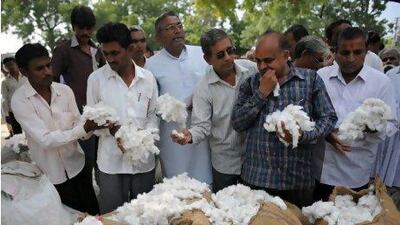MUMBAI // The record high price of cotton is squeezing India's many textile producers and apparel retailers and driving up the prices of other fibres, industry insiders say.
Mandhana Industries, a textile and apparel producer whose clients include Mango and Tommy Hilfiger, said profits had been eroded due to higher cotton prices. The company has increased its prices by as much as 30 per cent in the past six months, said Manish Mandhana, its joint managing director.
The rising price of cotton, which hit a new high yesterday, has also pushed up the cost of alternative materials, he said.
"People are basically taking complete advantage of this rally in cotton," he said, on the sidelines of the India Fashion Forum. "So, even the other fibres have gone up."
Cotton prices rose above US$2 a pound for the first time yesterday, on the back of recovering global demand for clothing and rising production in China, according to Bloomberg. The global supply of cotton has stayed largely static over the past two years, dropping slightly from 197.9 million bales during the 2009/2010 harvest to an estimated 197.6m during the 2010/2011 crop, according to Standard Chartered. But consumption has increased sharply during that period as the global economy recovers and demand increases from emerging markets such as China.
The price rally is having a "drastic" impact, said Shail Akhil Patel, the marketing manager of Arvind Industries, which supplies the likes of Walmart, Lee, Wrangler and Nautica.
Arvind's revenues have been strong at US$638.6m (Dh2.34 billion) in the nine months to December 31, up about 15 per cent from the same period a year earlier. Domestic demand, which represents 35 per cent of Arvind's business, continues to be strong, he said. But the price rally, which the company has passed on to clients, is hampering demand.
"Consumption is reducing day by day because of the price hike," he said. Raymond Apparel, an Indian clothing manufacturer, expects to raise its prices by five to 10 per cent in the coming year to compensate for increasingly expensive cotton and other fibres, said Shreyas Joshi, the company's president.
But the company is looking at how to add more value along with the price hike to avoid deterring consumers, he said.
"You can't just go up, selling the same product with different pricing, because the customer is seeking value at every price point. So, what kind of products do we offer now? What kind of services can we add?"
Raymond may introduce more cotton-blend trousers and suits to moderate the price impact, he said. As it is difficult to substitute another fibre for cotton, the same would not apply to its shirts ,said Mr Joshi.
"In an Asian country, you can't wear polyester and walk around. You're still going to feel hot," he said.
Mr Joshi expects the higher price tag to have an impact on customer buying patterns.
"We see some behavioural changes," he said. "Maybe, if someone is buying two shirts or four shirts, they might settle for a lesser number or delay the decision."
But Mr Patel hopes India's rapid projected rise in GDP will make up the shortfall. Per capita GDP is expected to grow from estimated $1,030 last year to $1,450 by 2013, according to McKinsey, a management consultancy.
"The disposable income of India will increase day by day, so the consumption will increase automatically," said Mr Patel.
But India's position as the second-largest cotton producer in the world also gives it an edge. In turn, India's textile industry has put pressure on the federal government to keep the current export cap of 5.5 million bales, despite an expected bumper crop this year.
"We definitely want that," said Mr Mandhana. "They shouldn't murder the domestic industry."
He also hopes high cotton prices will make domestically produced goods more attractive for consumers.
"It will discourage imports, which is good for the Indian industry," Mr Mandhana said. "Import goods are still at a 40 per cent duty, and with cotton being expensive, the goods being bought from abroad will be even more expensive."
aligaya@thenational.ae

Record cotton prices stitch up Indian retailers
The high price of cotton is hurting India's textile producers and apparel retailers and driving up the prices of other fibres, industry insiders say.
Most popular today
